While it may seem obvious at first, you may not know all of the differences between a river otter vs sea otter. There are quite a few to discuss, as river otters and sea otters belong to different genuses of animal. Plus, their overall diets, lifespans, and locations differ from one another, not to mention how different they are in appearance!
In this article, we will address all of these differences in detail, including their physicality and social behavior. With this insight, you should have a better grasp as to what makes both river otters and sea otters special. Let’s dive in and get started!
Comparing River Otter vs Sea Otter
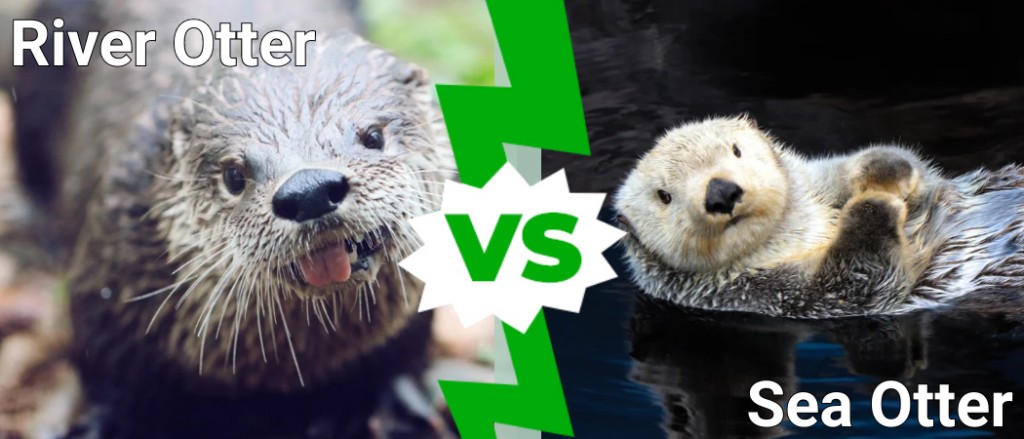
| River Otter | Sea Otter | |
|---|---|---|
| Genus | Lontra | Enhydra |
| Appearance | Skinny and slender with long tail; brown fur and sleek appearance | Wide and furry body, short tail; large back feet perfect for swimming |
| Location Found | Rivers and seas | Seas only |
| Size | 3-4 feet long; 15-20 pounds | 3-5 feet long; 20-80 pounds |
| Diet and Lifespan | Fish, frogs, crayfish, birds, and reptiles; 9-12 years | Sea urchins, clams, crabs, seaweed; 12-15 years |
Key Differences Between River Otter vs Sea Otter
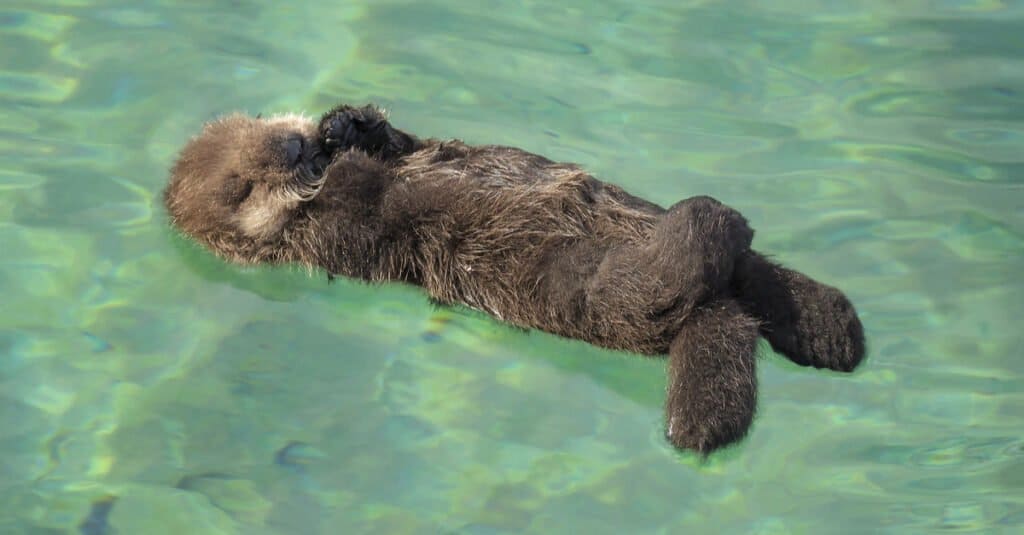
Sea otters have a different diet from river otters, given their habitat and saltwater location.
©Chase Dekker/Shutterstock.com
There are many distinguishing features between a river otter vs sea otter. River otters are smaller than sea otters in both length and weight. Sea otters have a different diet from river otters, given their habitat and saltwater location. Additionally, river otters have a very different social structure from sea otters, often preferring solitude over a sea otter’s committed family structure.
Let’s talk more about all of these differences in more detail now.
River Otter vs Sea Otter: Species Classification
One of the main differences between a river otter vs sea otter is their species or genus classification. While they are both otters, river otters belong to the Lontra genus, while sea otters belong to the Enhydra genus. This makes them very different animals, especially when you consider the fact that sea otters are the only members of their genus.

River otters belong to the
Lontragenus, while sea otters belong to the
Enhydragenus.
©iStock.com/Artush
River Otter vs Sea Otter: Appearance
Another difference between river otters and sea otters is their appearance. You may already have an idea as to what makes river otters and sea otters look so different from one another. For example, sea otters are much larger than river otters in both length and weight. The average river otter only weighs 15-20 pounds, while sea otters can reach anywhere from 20-80 pounds depending on their gender and age.
Their bodies and feet are also shaped very differently as well. Sea otters have back feet that are larger than their front feet, and much larger than the feet of a river otter. A sea otter also has a shorter tail than a river otter, and river otters are narrower in their body mass. Sea otters also have thicker fur, often with white markings, while river otters have sleeker fur to match their streamlined bodies.
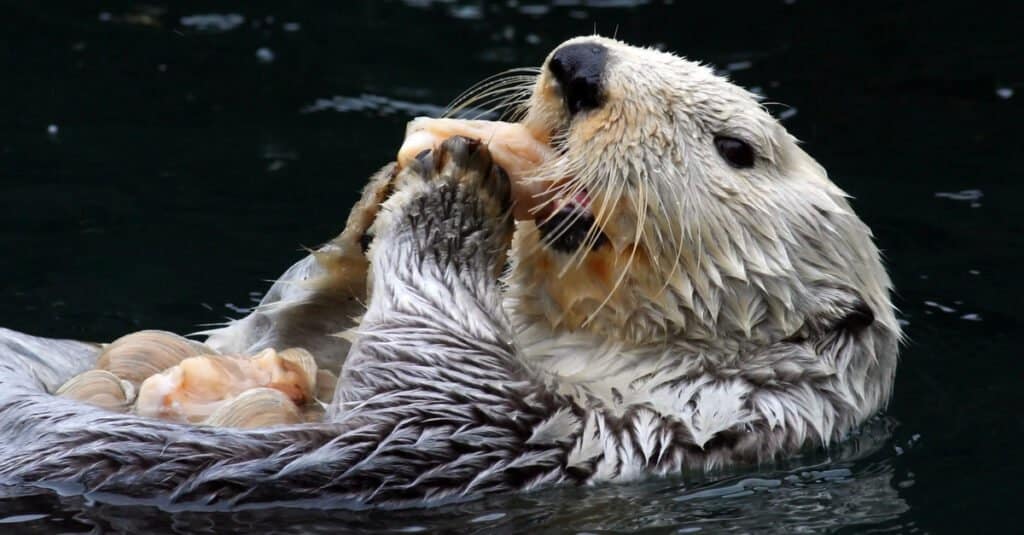
River otters prefer to eat fish, frogs, crayfish, birds, and reptiles, while sea otters enjoy sea urchins, clams, crabs, and seaweed.
©Kirsten Wahlquist/Shutterstock.com
River Otter vs Sea Otter: Locations and Habitats
Another key difference between a river otter vs sea otter is their preferred locations and habitats. While it may be obvious, river otters are found in rivers while sea otters are found in the sea. However, river otters can swim in saltwater if there is an ocean near their preferred river habitat.
River otters and sea otters also have habitat preferences in these unique ecosystems. Sea otters spend the majority of their time in the ocean, while river otters spend their lives on land unless they need to hunt or travel elsewhere. This is an important distinction to make, as sea otters are especially clumsy when they get on land!
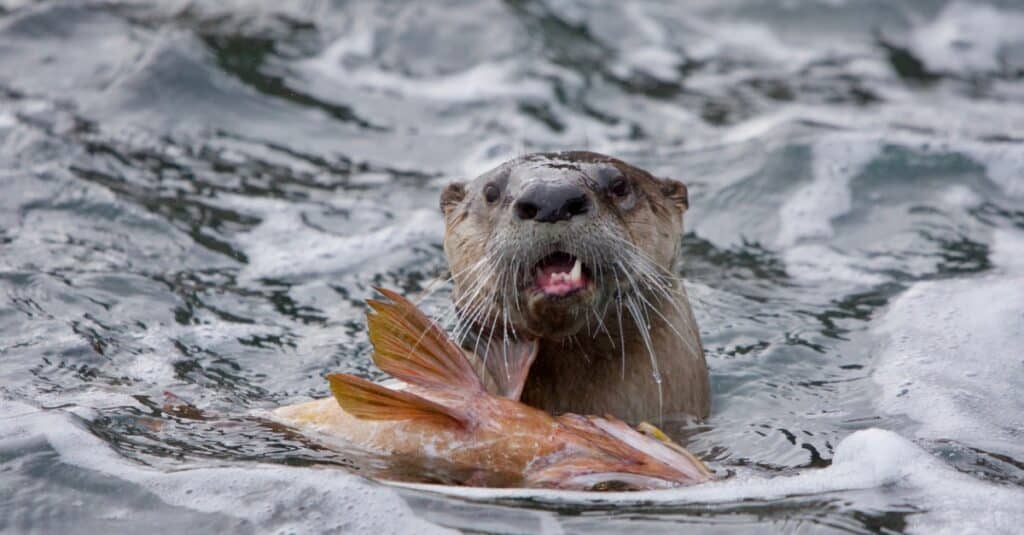
Sea otters spend the majority of their time in the ocean, while river otters spend their lives on land unless they need to hunt or travel elsewhere.
©iStock.com/DanielLacy
River Otter vs Sea Otter: Diet and Lifespan
The dietary preferences and lifespans of river otters and sea otters differ as well. Sea otters have an average lifespan of 12-15 years in the wild while river otters live an average of 9-12 years. This is likely due to their respective sizes and predators in their environments, as sea otters grow much larger than river otters do.
River otters also eat a different diet when compared to sea otters. Given their preferred habitats, this is only natural, though there are some dietary overlaps between sea otters and saltwater river otters. However, river otters prefer to eat fish, frogs, crayfish, birds, and reptiles, while sea otters enjoy sea urchins, clams, crabs, and seaweed.
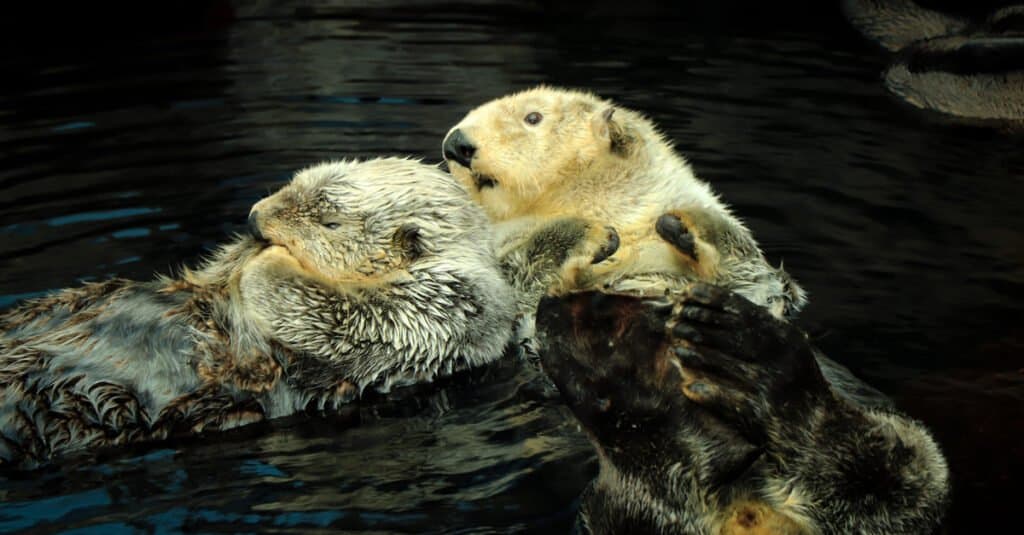
Sea otters mate for life, as many people know, but this is not the same for river otters.
©nvphoto/Shutterstock.com
River Otter vs Sea Otter: Social Behaviors and Mating
A final difference between a river otter vs sea otter lies in their social behaviors and mating habits. Sea otters mate for life, as many people know, but this is not the same for river otters. The majority of river otters mate with multiple otters throughout the course of their lives, and they may have multiple litters in a year.
Sea otters commit to one another and raise one pup at a time. Their familial units are very strong, while river otters tend to lead solitary lives. Male river otters are extremely territorial, while sea otters form more friendships and bonds with one another overall. This isn’t where their social behavioral differences end, however.
While both species enjoy the company of many otters, sea otters form powerful partnerships with their chosen mate. River otters can be found in pairs, but they tend to spend time with other otters in a more casual way. The notion that sea otters fall in love and hold hands in the ocean so that they don’t drift away from one another is a foreign concept to a river otter!
The photo featured at the top of this post is © nvphoto/Shutterstock.com
Thank you for reading! Have some feedback for us? Contact the AZ Animals editorial team.






